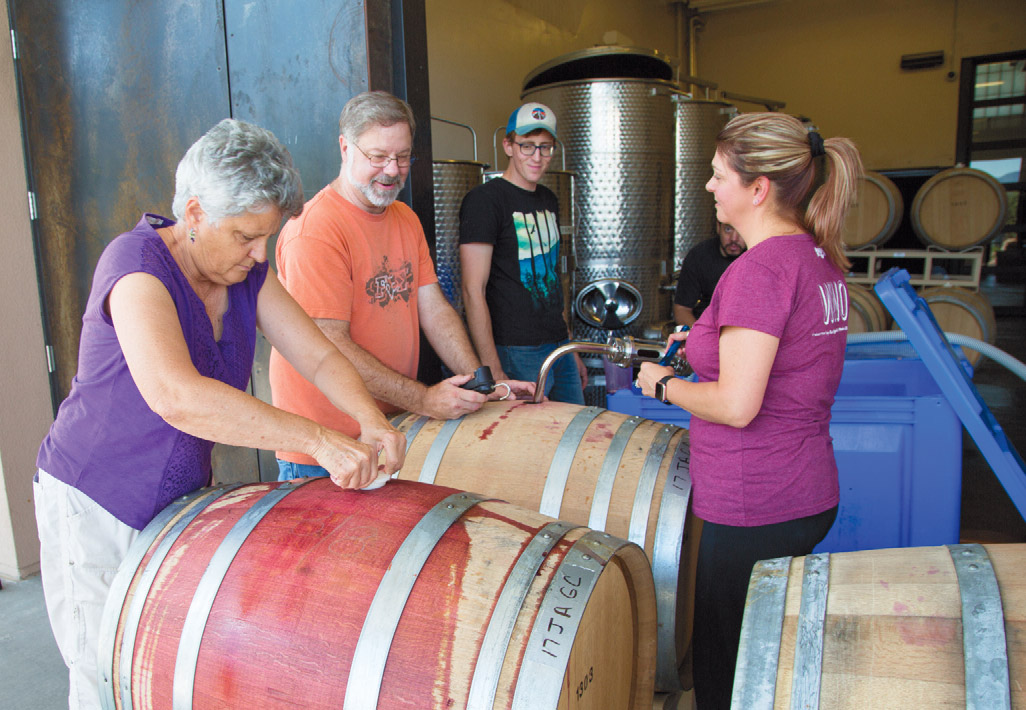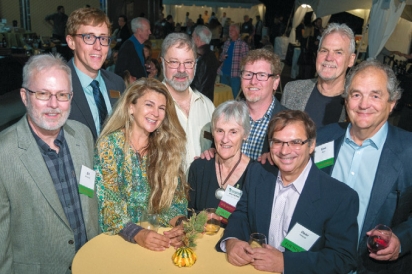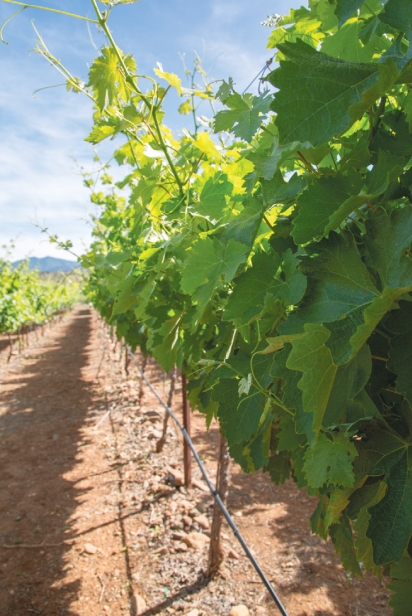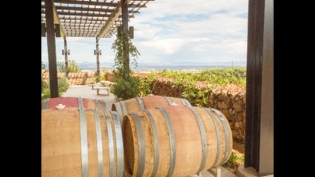A Call to Emerging Wine Makers
Arizona’s fine wines are winning major national competitions, and the success is energizing the booming wine industry here. Boutique wineries in Sonoita, Wilcox, the Prescott area and Verde Valley are a big draw for tourists and residents alike, adding a new and sophisticated dimension to the visitor experience in Arizona. The industry boasts a $56 million contribution to the state’s economy and supports over 600 jobs.
But it’s not just the commercial vintners that are making delicious wines in Arizona; many amateur/home winemakers have refined their skills to create enjoyable wines from a range of grape varieties, as well as other fruits.
The inaugural Emerging Winemakers Competition has been established to recognize the talent and expertise of these under-the-radar winemakers. The competition, envisioned as an annual event, is sponsored by the “Grand Crew,” a student and alumni organization of the viticulture and enology program at Yavapai College in Clarkdale, along with Friends of the Southwest Wine Center.
The competition is open to any Arizona resident 21 years or older who makes wine that is unavailable commercially. Red and white wines, as well as fruit wines, are eligible. Gold, silver and bronze medals will be awarded. Next April 21, the Southwest Wine Center will welcome the hobby winemakers and interested members of the community to Yavapai College for the awards ceremony to showcase the professional and economic opportunities in the industry.
If you are a home winemaker and proud of your wines, the competition will be a chance to have your wines confidentially evaluated by well-known experts in the industry. They will tell you if you are on the right track, or where improvement is needed. There will be a seminar to learn techniques to improve or adjust wines that are less than pleasing.
The competition is also a chance to meet other amateur winemakers as well as professionals who are engaged in the Arizona wine industry. Many of the students in the college program are wine hobbyists; some have worked in the industry in various capacities; some are reviving family traditions and a few even grow their own grapes. Through the program they are preparing for career opportunities in the expanding grape and wine business in Arizona.
Bill Anderson from Carefree is lead organizer of the competition. Now retired, Bill and his daughter, Lisa Russell, also a graduate of the program, hope to establish their own winery in the near future.
The goal, Bill says, is to discover the hidden talents and knowledge of home winemakers across the state. The contest will give contestants a chance to share and compare their experiences from the various microclimates, soils and elevations of Arizona, thereby enriching everyone’s craft. They will have the opportunity to learn from wine experts about the strengths and weaknesses in their vintages.
The Competitors
I interviewed a few of the students and alumni who are entering the competition to discover their winemaking stories and the goals they have.
Tom Messier, a Yavapai College alumnus, is from Cave Creek. Tom, a self-described “cellar rat” who works at the Southwest Wine Center, gave me a tour of the impressive facilities and tasting room. “I met a friend who made wines and, intrigued by the idea, I started making grape wine five years ago from a kit,” he says. “I moved beyond the kit, then began to make fruit wine, taking advantage of the diversity of fruits ripening throughout the season. I signed up for the school program so I could learn the details and understand the chemistry that happens in winemaking.”
Tom makes wine from tomatoes, peaches, strawberries and pears, as well as exotic combinations with oranges such as spiced orange wine and an orange chocolate wine. He says that the 2017 Arizona grape harvest has been good. The grapes he is using this season are all Arizona grown, including a Barbera, Petit Manseng and a Syrah from the Wilcox Bench region, a Primitivo from Tucson and a variety called Delaware from a friend’s backyard vineyard in Sedona.
For Tom, the art of winemaking lies in the blending process. He pre-ferments the individual varietals in oak barrels then gathers with friends and family to taste and blend them. They experiment with different percentages of the individual wines until they arrive at the most pleasing combination.
“The regional differences in soils and elevations across Arizona yield distinct qualities of terroir in the grapes, and they vary from one vintage to the next. These factors, along with yeasts and processing techniques, are what define the quality and uniqueness of each wine.”
For the competition Tom will enter a blend of Petit Manseng and Syrah grapes, and maybe a peach or citrus wine too.
Ron Wisniewski has over three years of home experience in winemaking. He grows many of the grapes himself, including Barbera, Sangiovese, Chenin Blanc and Chardonnay. He keeps the varietals aging separately in oak barrels.
“I blend them after they are oaked,” Ron says. “I love Chiantis and Riojas and try to create wines in those styles.”
Like Tom, he brings together friends for experimenting and tasting before he arrives at the final blend percentages. “The Barbera grape is more acidic, the Cabernet is more tannic and bold. The nature of the grapes changes with each season, and so does the sugar content: the higher the sugar content, the better the taste.
Additionally, you want grapes that hold their acids in the hot climate, to achieve the right brix. The challenge in Arizona is to keep that pH in balance.”
Ron experiments with growing vines from his own cuttings. “There are no nurseries in Arizona. Only one vineyard grows their own stock. This could be an emerging agricultural commodity.”
For Ron, “winemaking is a means of expressing oneself, one’s land and the terroir.” He says, “I have entered national competitions before, but this contest is a great opportunity to get feedback from wine experts.”
John Brixen is in the advertising and marketing business in Flagstaff. Inspired by the growth and economic potential of the wine industry in Arizona, he signed up for the viticulture program at Yavapai College in 2016.
2017 will be his first vintage. His grape wine entry will be a 100% Sangiovese varietal, fermented in French and American oak barrels until February 2018. He will also enter a prickly pear wine from tunas harvested on the college grounds. John is keeping alive his grandmother’s tradition of making this wine every year for the holidays.
John is on the board of the Grand Crew competition and says they are “looking to give attention to the career opportunities in this growing industry. The Southwest Wine Center is focused on boutique wines produced on a small scale, in counterpoint to industrial wines.”
Additionally, John says, “grapes are a relatively sustainable crop for the desert. Once the vines are established their water needs are fairly low. Grapes provide a higher income yield per acre than cattle, so many ranchers are incorporating vineyards on their ranches.”
He adds that the introduction of grapevines is a big investment of time and money. Patience and a tolerance for risk are essential, as it takes about five to seven years before the vines produce enough fruit to harvest for wine. Happily, established vineyards are expanding now, and new ones are being planted.
Meanwhile, wine lovers can explore an abundant variety of distinctive Arizona wines available now, and savor the unique terroir of our desert state.
Emerging Winemakers Competition
To learn more about the competition and to download the rules and entry forms, go to emergingwinemakers.com. Follow the competition at facebook.com/YCGrandCrew.
Wine entries, entry forms and fees ($10 per bottle) may be submitted between March 1 and March 31, 2018. All entries must be from Arizona and can be mailed or dropped off at the college or at Brew Your Own Brew in Gilbert.
The results of the judging and the awards ceremony will be available on Saturday, April 21, 2018, at the Southwest Wine Center. While the wines from the competition will not be available for sale due to legal restrictions at the college, local wines and food will be served at the awards celebration following the announcements.









